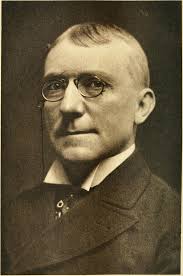Armazindy Page #11
James Whitcomb Riley poems book published in the 1894 book Armazindy and received very negative reviews that referred to poems like "The Little Dog-Woggy" and "Jargon-Jingle" as "drivel" and to Riley as a "worn out genius". Most of his growing number of critics suggested that he ignored the quality of the poems for the sake of making money.
“Shet up!” screamed Mr. Twiggs, with a pretended gust of rage, kicking lamely at the feathered oracle; “I’ll ‘Tude’s-come-home’ ye! W’y, a feller can’t hear his ears for your infernal squawkin’!” And then, turning toward the serious eyes that peered rebukingly into his own, his voice fell gentle as a woman’s: “Well, there, Tudens, I beg parding; I do indeed. Don’t look at me thataway. I know I’m a great, rough, good-for—”But a warm, swift kiss cut short the utterance; and as the girl drew back, still holding the bright old face between her tender palms, he said simply, “You’re a queer girl, Tudens; a queer girl.” “Ha! am I?” said the girl, in quite evident heroics and quotation, starting back with a theatrical flourish and falling into a fantastic attitude.—“‘Troth, I am sorry for it; me poor father’s heart is bursting with gratichude, and he would fain ease it by pouring out his thanks to his benefactor.’” “Werry good! Werry good, indeed!” said Mr. Twiggs, gazing wistfully upon the graceful figure of the girl. “You’re a-growin’ more wonderful’ clever in your ‘presence’ every day, Tude. You don’t think o’ nothink else but your actin’, do ye, now?” And, as Mr. Twiggs concluded his observations, a something very like a sigh came faltering from his lips. “Why, listen there! Ah-ha!” laughed Tude, clapping her hands and dancing gayly around his chair.—“Why, you old melancholy Dane, you! are you actually sighing?” Then, dropping into a tragic air of deep contrition, she continued: “‘But, believe me, I would not question you, but to console you, Wilford. I would scorn to pry into any one’s grief, much more yours, Wilford, to satisfy a busy curiosity.’” “Oh, don’t, Tude; don’t rehearse like that at me!—I can’t a-bear it.” And the serious Mr. Twiggs held out his hand as though warding off a blow. At this appeal the girl’s demeanor changed to one of tenderest solicitude. “Why, Pop’m,” she said, laying her hand on his shoulder, “I did not mean to vex you—forgive me. I was only trying to be happy, as I ought, although my own heart is this very minute heavy—very heavy—very.—No, no; I don’t mean that—but, Father, Father, I have not been dutiful.” “W’y, yes, you have,” broke in Mr. Twiggs, smothering the heavy exclamation in his handkerchief. “You ain’t been ondutiful, nor nothink else. You’re jest all and everythink that heart could wish. It’s all my own fault, Tudens; it’s all my fault. You see, I git to thinkin’ sometimes like I was a-goin’ to lose you; and now that you are a-comin’ on in years, and gittin’ such a fine start, and all, and position and everythink.—Yes-sir! position, ’cause everybody likes you, Tudens. You know that; and I’m that proud of you and all, and that selfish, that it’s onpossible I could ever, ever give you up;—never, never, ever give you up!” And Mr. Twiggs again stifled his voice in his handkerchief and blew his nose with prolonged violence. It may have been the melancholy ticking of the clock, as it grated on the silence following, it may have been the gathering darkness of the room, or the plaintive sighing of the rising wind without, that caused the girl to shudder as she stooped to kiss the kind old face bent forward in the shadows, and turned with feigned gayety to the simple task of arranging supper. But when, a few minutes later, she announced that Twiggs and Tudens’s tea was waiting, the two smilingly sat down, Mr. Twiggs remarking that if he only knew a blessing, he’d ask it upon that occasion most certainly. “—For on’y look at these-’ere ’am and eggs,” he said, admiringly: “I’d like to know if the Queen herself could cook ’em to a nicer turn, or serve ’em up more tantaliz’in’er to the palate. And this-’ere soup,—or whatever it is, is rich as gravy; and these boughten rolls ain’t a bad thing either, split in two and toasted as you do ’em, air they, Tude?” And as Mr. Twiggs glanced inquiringly at his companion, he found her staring vacantly at her plate. “I was jest a-sayin’, Tudens—” he went on, pretending to blow his tea and glancing cautiously across his saucer. “Yes, Pop’m, I heard you;—we really ought to have a blessing, by all means.” Mr. Twiggs put down his tea without tasting it. “Tudens,” he said, after a long pause, in which he carefully buttered a piece of toast for the second time,—“Tudens, I’m ’most afeard you didn’t grasp that last remark of mine: I was a-sayin’—” “Well—” said Tudens, attentively. “I was a-sayin’,” said Mr. Twiggs, averting his face and staring stoically at his toast—“I was a-sayin’ that you was a-gittin’ now to be quite a young woman.” “Oh, so you were,” said Tudens, with charming naïveté. “Well,” said Mr. Twiggs, repentantly, but with a humorous twinkle, “if I wasn’t a-sayin’ of it, I was a-thinkin’ it.”—And then, running along hurriedly, “And I’ve been a-thinkin’ it for days and days—ever sence you left the ‘balley’ and went in ‘chambermaids,’ and last in leadin’ rôles. Maybe you ain’t noticed it, but I’ve had my eyes on you from the ‘flies’ and the ‘wings’; and jest betwixt us, Tudens, and not for me as ort to know better, and does know better, to go a-flatterin’, at my time o’—or to go a-flatterin’ anybody, as I said, after you’re a-gittin’ to be a young woman—and what’s more, a werry ’andsome young woman!” “Why, Pop’m!” exclaimed Tudens, blushing. “Yes, you are, Tudens, and I mean it, every word of it; and as I was a-goin’ on to say, I’ve been a-watchin’ of you, and a-layin’ off a long time jest to tell you summat that will make your eyes open wider ’an that! What I mean,” said Mr. Twiggs, coughing vehemently and pushing his chair back from the table—“what I mean is, you’ll soon be old enough to be a-settin’ up for yourself-like, and a-marry’—W’y, Tudens, what ails you?” The girl had risen to her feet, and, with a face dead white and lips all tremulous, stood clinging to her chair for support. “What ails you, Tudens?” repeated Mr. Twiggs, rising to his feet and gazing on her with a curious expression of alarm and tenderness. “Nothing serious, dear Pop’m,” said Tudens, with a flighty little laugh,—“only it just flashed on me all at once that I’d clean forgotten poor ‘Dick’s’ supper.” And as she turned abruptly to the parrot, cooing and clucking to him playfully,—up, up from some hitherto undreamed-of depth within the yearning heart of Mr. Twiggs mutely welled the old utterance, “Tude’s a queer girl!” “Whatever made you think of such a thing, Father?” called Tudens, gayly; and then, without waiting for an answer, went on cooing to the parrot,—“Hey, old dicky-bird! do you think Tudens is a handsome young woman? and do you think Tudens is old enough to marry, eh?” This query delivered, she broke into a fit of merriment which so wrought upon the susceptibilities of the bird that he was heard repeatedly to declare and affirm, in most positive and unequivocal terms, that Tude had actually come home.
Translation
Translate and read this book in other languages:
Select another language:
- - Select -
- 简体中文 (Chinese - Simplified)
- 繁體中文 (Chinese - Traditional)
- Español (Spanish)
- Esperanto (Esperanto)
- 日本語 (Japanese)
- Português (Portuguese)
- Deutsch (German)
- العربية (Arabic)
- Français (French)
- Русский (Russian)
- ಕನ್ನಡ (Kannada)
- 한국어 (Korean)
- עברית (Hebrew)
- Gaeilge (Irish)
- Українська (Ukrainian)
- اردو (Urdu)
- Magyar (Hungarian)
- मानक हिन्दी (Hindi)
- Indonesia (Indonesian)
- Italiano (Italian)
- தமிழ் (Tamil)
- Türkçe (Turkish)
- తెలుగు (Telugu)
- ภาษาไทย (Thai)
- Tiếng Việt (Vietnamese)
- Čeština (Czech)
- Polski (Polish)
- Bahasa Indonesia (Indonesian)
- Românește (Romanian)
- Nederlands (Dutch)
- Ελληνικά (Greek)
- Latinum (Latin)
- Svenska (Swedish)
- Dansk (Danish)
- Suomi (Finnish)
- فارسی (Persian)
- ייִדיש (Yiddish)
- հայերեն (Armenian)
- Norsk (Norwegian)
- English (English)
Citation
Use the citation below to add this book to your bibliography:
Style:MLAChicagoAPA
"Armazindy Books." Literature.com. STANDS4 LLC, 2025. Web. 10 Jan. 2025. <https://www.literature.com/book/armazindy_946>.




Discuss this Armazindy book with the community:
Report Comment
We're doing our best to make sure our content is useful, accurate and safe.
If by any chance you spot an inappropriate comment while navigating through our website please use this form to let us know, and we'll take care of it shortly.
Attachment
You need to be logged in to favorite.
Log In